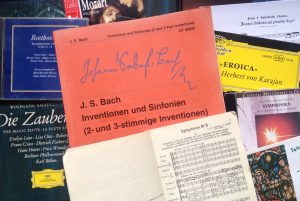Violate rules, renounce achievements; From Baroque to Romanticism
In large upheavals or renewals, it is often necessary to break old rules and drop existing achievements, even if they are considered great art. Let’s take a look in the history of music and what happened during the transition from the Baroque to the Romantic period. * To rough classification: Johann Sebastian Bach dies in 1750 and 1756 Wolfgang Amadeus Mozart is born. The most important buzzword of that time of upheaval is called „sensibility“. The great Bach son Carl Philipp Emanuel Bach writes an essay in 1753 about the „change of passions“.
In order to achieve this „change“ within one piece, it was necessary to abandon almost all values of the so-called „strict sentence“ (“Strenger Stil” in german). For example, in Baroque compositions, sometimes up to 20 chordal voices with equal rights are hearable. But within one musical movement only one „affect“ – that is the expression of a single sensation – could be represented. The composers of the sensitive style throw this art of intertwined melodies overboard. The great art of the strict sentence is given up in favor of an easily perceivable melody. One searches for the „noble simplicity“ and designs large forms with symmetrical structure. The sacrifice of the art of the fugue opens possibilities of much more dynamic design. If a musical movement in the baroque period had a continuous volume level, the sound image can now change completely by the targeted use of crescendo and decrescendo. Further, the dramatic composition is even increased by a slowing of the harmony changes. If the chord change in a Bach prelude is still very fast and frequent, a Mozart is much more economical with it. In the description this appears to us as simplification or impoverishment, in the result heard, however, in romantic music the change of harmony becomes an „event“. The fast pace “Presto” is born and the flexibility of the rhythm is used as a new means of expression. Now, within a single piece, all sorts of moods could be represented and, in the sensitive simplicity, redeem the „change of passions“ demanded by Carl Philip Immanuel Bach. Here was a detonator, which should release unsuspected energies.
* The term of the so-called “classic music” I go over here because it is more of a value than a time period.
DMZ



